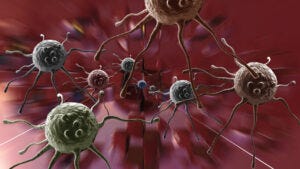June 2, 2022

Regeneron has agreed to supply Elicio Therapeutics with the drug Libtayo for clinical trials of its candidate cancer vaccine, ELI-002.
The trial will examine the products as a combination in patients with KRAS (Kirsten rat sarcoma virus)-driven tumors including stage III and IV non-small cell lung cancer, stage IV colorectal cancer and unresectable, locally advanced or oligometastatic pancreatic ductal adenocarcinoma.
KRAS mutations are among the most prevalent human cancers, driving 32% of lung cancers, 40% of colorectal cancers and 85% to 90% of pancreatic cancer cases.

Image: Stock Photo Secrets
ELI-002 is comprised of AMP (amphiphile)-modified mutant KRAS peptide antigens and ELI-004, an AMP-modified immune-stimulatory oligonucleotide CpG adjuvant.
According to Elicio, the AMP mutant KRAS peptides and AMP CpG are targeted to the lymph node where they can potentially enhance the action of key immune cells.
Libtayo (cemiplimab) – which is being developed by Regeneron and Sanofi – is a fully human monoclonal antibody that is designed to target the immune checkpoint receptor PD-1 on T cells, in patients with KRAS-driven tumors.
The supply agreement – financial terms of which were not disclosed – is pivotal to the wider development of ELI-002 according to Annette Matthies, chief business officer at Elicio.
“Regeneron is a leading biotech company, and this clinical supply agreement supports the development of our ELI-002 therapeutic cancer vaccine program as well as our AMP platform.”
Matthies added that, “With the ongoing Phase I trial studying ELI-002 as a monotherapy and this upcoming combination study, we believe that ELI-002 has the potential to make a difference in the often-challenging KRAS space.”
The ongoing Phase I study – known as Amplify-201 – is assessing ELI-002 in patients with early-stage KRAS-driven solid tumors, following surgery and chemotherapy.
A Phase Ib/II trial – planned for early 2023 – will study the broad spectrum 7-peptide formulation of ELI-002 that is designed to provide immune response coverage against seven of the most common KRAS mutations.
According to Elicio the approach is designed to increase the potential patient population for ELI-002 and reducing the chance of resistance mechanisms.
About the Author
You May Also Like




